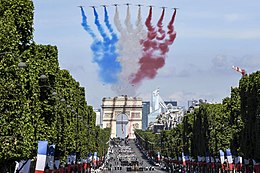
Back Franse Nasionale Dag Afrikaans يوم الباستيل Arabic Дзень узяцця Бастыліі Byelorussian ফ্রান্সের জাতীয় উৎসব Bengali/Bangla Gouel broadel Bro-C'hall Breton Festa nacional francesa Catalan Бастилине илнĕ кун CV Bastilledagen Danish Nationalfeiertag (Frankreich) German Εθνική γιορτή της Γαλλίας Greek
| Bastille Day | |
|---|---|
 The Patrouille de France with nine Alpha Jets over the Champs-Élysées in Paris in 2017, during the Bastille Day military parade | |
| Also called | French National Day (Fête nationale) The Fourteenth of July (Quatorze juillet) |
| Observed by | France |
| Type | National day |
| Significance | Commemorates the Storming of the Bastille on 14 July 1789,[1][2] and the unity of the French people at the Fête de la Fédération on 14 July 1790 |
| Celebrations | Military parades, fireworks, concerts, balls |
| Date | 14 July |
| Next time | 14 July 2024 |
| Frequency | Annual |
Bastille Day is the common name given in English-speaking countries to the national day of France, which is celebrated on 14 July each year. In French, it is formally called the Fête nationale française (French: [fɛt nɑsjɔnal fʁɑ̃sɛːz]; 'French National Celebration'); legally it is known as le 14 juillet (French: [lə katɔʁz(ə) ʒɥijɛ]; 'the 14th of July').[3]
French National Day is the anniversary of the Storming of the Bastille on 14 July 1789,[1][2] a major event of the French Revolution,[4] as well as the Fête de la Fédération that celebrated the unity of the French people on 14 July 1790. Celebrations are held throughout France. One that has been reported as "the oldest and largest military parade in Europe"[5] is held on 14 July on the Champs-Élysées in Paris in front of the President of France, along with other French officials and foreign guests.[6][7]
- ^ a b "Bastille Day – 14th July". Official Website of France. Archived from the original on 15 July 2014.
A national celebration, a re-enactment of the storming of the Bastille ... Commemorating the storming of the Bastille on 14th July 1789, Bastille Day takes place on the same date each year. The main event is a grand military parade along the Champs-Élysées, attended by the President of the Republic and other political leaders. It is accompanied by fireworks and public dances in towns throughout the whole of France.
- ^ a b "La fête nationale du 14 juillet". Official Website of Elysée. 21 October 2015.
- ^ Article L. 3133-3 of French labour code on www.legifrance.gouv.fr.
- ^ "The Beginning of the French Revolution, 1789". EyeWitness to History.
Thomas Jefferson was America's minister to France in 1789. As tensions grew and violence erupted, Jefferson traveled to Versailles and Paris to observe events first-hand. He reported his experience in a series of letters to America's Secretary of State, John Jay. We join Jefferson's story as tensions escalate to violence on July 12:
July 12
In the afternoon a body of about 100 German cavalry were advanced and drawn up in the Palace Louis XV. and about 300 Swiss posted at a little distance in their rear. This drew people to that spot, who naturally formed themselves in front of the troops, at first merely to look at them. But as their numbers increased their indignation arose: they retired a few steps, posted themselves on and behind large piles of loose stone collected in that Place for a bridge adjacent to it, and attacked the horse with stones. The horse charged, but the advantageous position of the people, and the showers of stones obliged them to retire, and even to quit the field altogether, leaving one of their number on the ground. The Swiss in their rear were observed never to stir. This was the signal for universal insurrection, and this body of cavalry, to avoid being massacred, retired towards Versailles.
The people now armed themselves with such weapons as they could find in Armourer's shops and private houses, and with bludgeons, and were roaming all night through all parts of the city without any decided and practicable object.
July 13
...A Committee of magistrates and electors of the city are appointed, by their bodies, to take upon them its government.
The mob, now openly joined by the French guards, force the prisons of St. Lazare, release all the prisoners, and take a great store of corn, which they carry to the corn market. Here they get some arms, and the French guards begin to form and train them. The City committee determines to raise 48,000 Bourgeois, or rather to restrain their numbers to 48,000.' - ^ "France commemorates WWI centenary on Bastille Day". France 24. 14 July 2014. Retrieved 13 July 2020.
- ^ "Champs-Élysées city visit in Paris, France – Recommended city visit of Champs-Élysées in Paris". Paris.com. Archived from the original on 7 August 2011. Retrieved 27 July 2011.
- ^ "Celebrate Bastille Day in Paris This Year". Paris Attractions. 3 May 2011. Archived from the original on 26 March 2012. Retrieved 27 July 2011.
© MMXXIII Rich X Search. We shall prevail. All rights reserved. Rich X Search